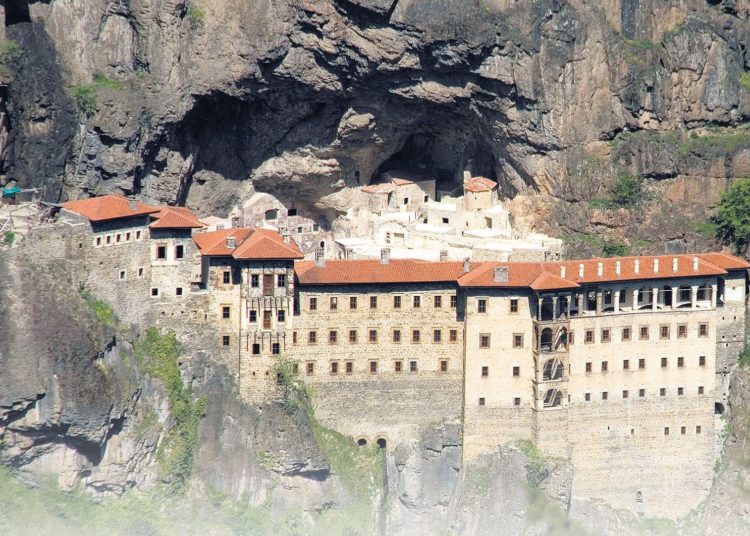Abdullah Bozkurt
A scare-mongering campaign stoking xenophobia in Turkey on anti-Greek nationalist sentiment, already robust with the political exploitation of long-running and unresolved problems in the Aegean and Cyprus, has been given a new impetus this year, prompting fresh concerns about the safety of Christians living in the 80-million-strong, predominantly Muslim nation.
Nordic Monitor obtained documents showing how the Turkish government’s monitoring of alleged clandestine Greek operations to revive “Pontianism” (Pontusçuluk) in Turkey led to the murder of a 61-year-old Christian priest in the northeastern Black Sea region. The intelligence document shows Turkish authorities had wiretapped the Italian cleric on suspicion of involvement in activities to help the resurgence of Pontianism before he was murdered by a nationalist teenager on February 5, 2006.
Similar concerns were raised this year against the backdrop of a heated political rivalry during the Istanbul municipal elections when the opposition candidate was accused of being associated with Greeks by Turkish President Recep Tayyip Erdoğan and his associates. The Islamist ruling Justice and Development Party (AKP) and its supporters ran a frenzied defamation campaign to label Ekrem İmamoğlu as a Pontic Greek.
The negative campaign picked up a story in the Greek Ethnos newspaper that described İmamoğlu as “the Pontic who took Istanbul from Erdoğan,” in apparent reference to the opposition politician’s birthplace of Trabzon, which was once part of Pontus. “Who were most happy with the elections of March 31? The Greeks. Do you remember the front pages of Greek newspapers saying that ‘a Greek conquered the city’?” Erdoğan said during a rally in July after the repeat election for the position of Istanbul mayor.

Pontian Greeks (Pontus Rumları) are an ethnic group consisting of Greeks who have traditionally lived in Turkey’s Black Sea region and had an autonomous state there until the 13th century. Though many centuries have passed, their numbers have been dramatically reduced and they pose no threat, Pontian Greeks have long been regarded as a national security risk by successive Turkish governments. Moreover, the Turkish paranoia was kept alive, with Turkish critics and foreigners often accused of somehow helping the resurgence of Pontianism. At times Pontianism was associated with the Megali Idea of setting up a Greek state in line with the former borders of the Byzantine Empire.
The document shows that the Trabzon police applied to a court in Erzurum for a warrant to monitor Father Andrea Santoro’s phone conversations, on November 8, 2006, three months before his murder. The police cited suspicions that Santoro might be engaging in “separatist activities to revive the state of Pontus” as the reason for its request for a wiretapping order. The Erzurum Specially Authorized 2nd High Criminal Court authorized the wiretap the same day.
Santoro, who was serving at the Santa Maria Church in Trabzon, was under surveillance and his phone was being wiretapped when he was killed by 16-year-old nationalist teenager Oğuzhan Akdin The killer was released in 2016 after serving only half his sentence due to an amnesty declared by the Erdoğan government that released close to 50,000 convicted felons to make room for the imprisonment of political prisoners. In an interview in with a local daily in January 2017, Akdin said he felt no remorse for killing the priest and that the only regret he had was putting the Turkish state in a difficult position.
Turkish authorities had also targeted another priest who served in the same city. The gendarmerie command in the province of Malatya, where Christian missionary Tilmann Geske, a 41-year-old German national, and two others were brutally murdered in 2007, listed Carl Magnus Stefan Persson, a protestant priest and Swedish national, as “suspicious.” The Trabzon Police Department had wiretapped Persson’s phone, suspecting him of involvement in activities to revive the Greek Pontus Empire in Trabzon. The Trabzon police in its records, where all suspicions regarding missionaries were logged, referred to Persson as Santoro’s “accomplice.”

The feeding frenzy against those who were suspected of being a “Pontus” enthusiast had led to brutal murders in Turkey in the past, and the real masterminds of the killings were never identified. The same is true for of the murder of Turkish-Armenian journalist Hrant Dink, who was gunned down outside his office in January 2007 by an ultranationalist teenager, who was also from Trabzon. The renewed paranoia fed by the same conspiracy may very well put lives in danger again with the top leadership of the Turkish government publicly entertaining such conspiracies.
The document also reveals a twist in the murder of Santoro and connects it to the murders in Malatya. On the same day that the police requested permission from the court to monitor the phone conversations of Father Santoro, it also asked for an order to wiretap Yasin Hayal, the instigator of the assassination of journalist Dink, and another man named Hasan Deveci. The two were suspected of having Salafi-Wahhabi leanings, according to the police request. The request also said the police had reason to believe Hayal and Deveci had contacts with other groups that had “radical ideas.” Although the two requests were made separately, on the day the court received the requests, a single warrant was issued authorizing the police to monitor the calls of both Hayal and Santoro.
Starting on November 8, 2005, the police monitored every phone conversation that Hayal and Santoro had for three months. The warrant was due to expire on February 8, 2006, three days after Santoro was killed. The role of Turkish National Intelligence Organization (MIT) in these murders was never proven, although the agency was ordered by the National Security Council to track and monitor Christian missionary activities in Turkey. In the case of the murder of Dink, MIT officers were identified as having threatened him, but the Erdoğan government did not allow an investigation into MIT and blocked requests from prosecutors.












